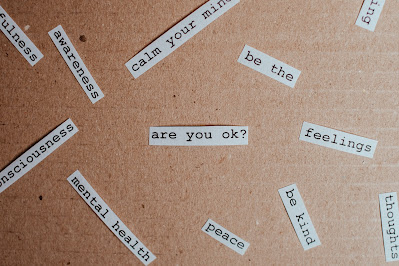Raising Mental Health Awareness: Strategies, FAQs & Importance
Introduction
Mental health is a vital part of our overall well-being. It encompasses our emotional, cerebral, and social well-being. Mental health problems are common, but sorely, they're also largely stigmatized. Not numerous people are apprehensive about how internal health workshops, what problems can arise, and how to take care of their internal health. Raising internal health mindfulness is of utmost significance to attack misconceptions and smirch girding internal health. It can also encourage people to prioritize their internal health and well-being, therefore leading them toward happier and further fulfilling lives.
Understanding Mental Health
Mental Health refers to the state of an existent's emotional, cerebral, and social well-being. It affects how we suppose, feel, and act, and plays a pivotal part in determining our capability to manage stress and acclimatize to changes in life. Admitting the significance of internal health is vital as it helps in the identification of symptoms, treatment, and forestallment of internal health diseases. Mental health can be astronomically divided into three stages- conforming, floundering, and thriving. It's essential to understand these stages to fete and manage the early signs of internal health issues. Flashback, internal health is as important as physical health and should be given the same care and attention.
Statistical Facts:
- 1 in 5 people worldwide experience mental health problems each year. Source: World Health Organization (WHO), "Mental Health Atlas 2021")
- Suicide is the 10th leading cause of death globally. Source: WHO, "Suicide Prevention" (2022)
- Mental health conditions cost the global economy $1 trillion each year in lost productivity. Source: The World Economic Forum, "The Economic and Social Impact of Mental Ill Health" (2021)
- Raising mental health awareness can help to reduce stigma and discrimination, and encourage people to seek help if they need it. Source: WHO, "Mental Health Gap Action Programme" (2022)
- There are a number of effective strategies for raising mental health awareness, including education, public awareness campaigns, and social media. Source: WHO, "Mental Health Promotion" (2022)
Factors Affecting Mental Health
Environmental Factors:
Our surroundings can greatly affect our internal well-being. Exposure to pollution, noise, and other environmental hazards can beget stress and anxiety. also, access to green spaces and natural geographies has been shown to ameliorate mood and reduce symptoms of depression. The impact of climate change on internal health is also a growing concern.
Cerebral Factors:
Our studies, feelings, and actions play a pivotal part in our internal health. Negative thinking patterns, similar to reflection and catastrophizing, can lead to anxiety and depression. Trauma, similar to abuse or neglect, can also have a continuing impact on internal well-being. Managing strategies similar to awareness and cognitive-behavioral remedies can help promote positive cerebral functioning.
Inheritable and Natural Factors:
Genetics and biology can also contribute to the development of internal health diseases. Variations in genes that affect neurotransmitter function have been linked to diseases similar to depression and schizophrenia. Hormonal imbalances and other natural factors can also impact internal health. Still, it's important to flashback that genetics and biology aren't the sole determinants of internal well-being.
Need for Raising Awareness:
We live in a world where there's still considerable smirch attached to internal health diseases. The lack of mindfulness and understanding about these issues has further fuelled the fire, leading to grave negative impacts on individualities and society as a whole. Ignoring internal health can affect in severe consequences that can last for a continuance. It's high time we start homogenizing exchanges around internal health and invest in raising mindfulness to bring about a positive change.
Strategies to Raise Mental Health Awareness:
Let's face it, utmost of us have not had a meaningful discussion about internal health, let alone an introductory understanding of it. That’s why educating the millions is one of the crucial strategies to raise mindfulness. Mental health is frequently a taboo subject, and we need to change this perception to encourage people to come forward and seek help. There’s a great deal of power in furnishing people with information and coffers, which can break the myths and misinformation girding internal health.
Open exchanges about internal health can help exclude the smirch and produce mindfulness. To do so, we need to encourage people to speak up, especially those impacted by internal health diseases. Sensitizing healthcare professionals is critical because frequently people who suffer from internal health diseases find it challenging to talk about it with their healthcare professionals. Support for internal health associations is also necessary because they can help connect people to the right internal health coffers and services.
Self-Care for Good Mental Health:
It's important to take care of our internal well-being, and tone- care is a pivotal aspect of that. Physical tone- care means taking care of our bodies through exercise, healthy eating, and proper sleep. Mental tone- care involves engaging in conditioning that stimulates our minds, like reading, learning new chops, and contemplation. Emotional tone- care is about feting and managing our feelings through conditioning like journaling, remedy, and spending time with loved ones. Taking care of yourselves, both physically and mentally, should be a top precedence to promote good internal health.
Conclusion
Do not stay for internal health issues to escalate. Taking care of yourself both physically and mentally helps you live a life of balance. By raising mindfulness and understanding around internal health, we can make great strides in perfecting our internal good and that of those around us. We must be compassionate towards people with internal health issues. Flashback to being kind to others is free! A positive change starts with a single step, take that step toward your internal heartiness moment.
FAQs
1. Why is raising mental health awareness important?
Answer: Raising mental health awareness is crucial because it helps to break the stigma surrounding mental health issues and promotes understanding and empathy. By increasing awareness, we can encourage early identification and intervention, reduce discrimination, and ensure individuals receive the support they need. It also helps to educate communities about the importance of self-care and mental well-being, ultimately leading to a healthier society.
2. How can individuals contribute to raising mental health awareness?
Answer: Individuals can contribute to raising mental health awareness in several ways:
Educate themselves: Learn about mental health, common disorders, and available resources to better understand and support those affected.
Share personal stories: Openly discussing personal experiences with mental health challenges helps reduce stigma and encourages others to seek help.
Promote self-care: Encourage practices such as regular exercise, adequate sleep, healthy eating, and stress reduction techniques to maintain good mental well-being.
Supportive listening: Be a compassionate listener and offer support to individuals who may be struggling. Show empathy, validate their feelings, and help them access professional help if needed.
3. How can workplaces promote mental health awareness?
Answer: Workplaces play a significant role in promoting mental health awareness. Some strategies include:
Implementing mental health policies: Establish policies that support employee well-being, such as flexible work arrangements, mental health days, and access to counseling services.
Training programs: Provide training for managers and employees on recognizing signs of mental health issues, reducing stigma, and fostering a supportive work environment.
Communication and awareness campaigns: Organize workshops, seminars, or webinars to educate employees about mental health, stress management, and available resources.
Employee assistance programs (EAPs): Offer confidential counseling services and resources to employees who may be experiencing mental health challenges.
4. How can schools raise mental health awareness among students?
Answer: Schools can play a crucial role in raising mental health awareness among students by implementing the following strategies:
Integration into the curriculum: Incorporate mental health education into the curriculum, teaching students about emotional well-being, coping strategies, and how to seek help.
School-wide campaigns: Organize awareness campaigns, assemblies, or workshops to discuss mental health, promote self-care, and reduce stigma.
Peer support programs: Establish peer support groups or initiatives where students can seek help or provide support to their peers.
Training for teachers: Provide training for teachers on recognizing signs of mental health issues, creating inclusive classrooms, and implementing effective strategies to support students' well-being.
5. How can social media be utilized to raise mental health awareness?
Answer: Social media platforms can be powerful tools for raising mental health awareness. Some strategies for utilizing social media include:
Sharing personal stories: Encourage individuals to share their experiences with mental health challenges to reduce stigma and foster a sense of community.
Educational content: Share informative and engaging content about mental health, self-care tips, and available resources to educate and support followers.
Collaborations with mental health organizations: Partner with mental health organizations to amplify their messages and campaigns, reaching a broader audience.
Mental health challenges or campaigns: Initiate social media challenges or campaigns focused on mental health, encouraging followers to participate and spread awareness.
Provide resources: Share links, helpline numbers, and websites where individuals can find reliable information and seek help for mental health concerns.
Remember that while social media can be a powerful tool, it's essential to prioritize the accuracy of information and promote a safe and supportive online environment for mental health discussions.
Introduction
Mental health is a vital part of our overall well-being. It encompasses our emotional, cerebral, and social well-being. Mental health problems are common, but sorely, they're also largely stigmatized. Not numerous people are apprehensive about how internal health workshops, what problems can arise, and how to take care of their internal health. Raising internal health mindfulness is of utmost significance to attack misconceptions and smirch girding internal health. It can also encourage people to prioritize their internal health and well-being, therefore leading them toward happier and further fulfilling lives.
Understanding Mental Health
Mental Health refers to the state of an existent's emotional, cerebral, and social well-being. It affects how we suppose, feel, and act, and plays a pivotal part in determining our capability to manage stress and acclimatize to changes in life. Admitting the significance of internal health is vital as it helps in the identification of symptoms, treatment, and forestallment of internal health diseases. Mental health can be astronomically divided into three stages- conforming, floundering, and thriving. It's essential to understand these stages to fete and manage the early signs of internal health issues. Flashback, internal health is as important as physical health and should be given the same care and attention.
Statistical Facts:
- 1 in 5 people worldwide experience mental health problems each year. Source: World Health Organization (WHO), "Mental Health Atlas 2021")
- Suicide is the 10th leading cause of death globally. Source: WHO, "Suicide Prevention" (2022)
- Mental health conditions cost the global economy $1 trillion each year in lost productivity. Source: The World Economic Forum, "The Economic and Social Impact of Mental Ill Health" (2021)
- Raising mental health awareness can help to reduce stigma and discrimination, and encourage people to seek help if they need it. Source: WHO, "Mental Health Gap Action Programme" (2022)
- There are a number of effective strategies for raising mental health awareness, including education, public awareness campaigns, and social media. Source: WHO, "Mental Health Promotion" (2022)
Factors Affecting Mental Health
Environmental Factors:
Our surroundings can greatly affect our internal well-being. Exposure to pollution, noise, and other environmental hazards can beget stress and anxiety. also, access to green spaces and natural geographies has been shown to ameliorate mood and reduce symptoms of depression. The impact of climate change on internal health is also a growing concern.
Cerebral Factors:
Our studies, feelings, and actions play a pivotal part in our internal health. Negative thinking patterns, similar to reflection and catastrophizing, can lead to anxiety and depression. Trauma, similar to abuse or neglect, can also have a continuing impact on internal well-being. Managing strategies similar to awareness and cognitive-behavioral remedies can help promote positive cerebral functioning.
Inheritable and Natural Factors:
Genetics and biology can also contribute to the development of internal health diseases. Variations in genes that affect neurotransmitter function have been linked to diseases similar to depression and schizophrenia. Hormonal imbalances and other natural factors can also impact internal health. Still, it's important to flashback that genetics and biology aren't the sole determinants of internal well-being.
Need for Raising Awareness:
We live in a world where there's still considerable smirch attached to internal health diseases. The lack of mindfulness and understanding about these issues has further fuelled the fire, leading to grave negative impacts on individualities and society as a whole. Ignoring internal health can affect in severe consequences that can last for a continuance. It's high time we start homogenizing exchanges around internal health and invest in raising mindfulness to bring about a positive change.
Strategies to Raise Mental Health Awareness:
Let's face it, utmost of us have not had a meaningful discussion about internal health, let alone an introductory understanding of it. That’s why educating the millions is one of the crucial strategies to raise mindfulness. Mental health is frequently a taboo subject, and we need to change this perception to encourage people to come forward and seek help. There’s a great deal of power in furnishing people with information and coffers, which can break the myths and misinformation girding internal health.
Open exchanges about internal health can help exclude the smirch and produce mindfulness. To do so, we need to encourage people to speak up, especially those impacted by internal health diseases. Sensitizing healthcare professionals is critical because frequently people who suffer from internal health diseases find it challenging to talk about it with their healthcare professionals. Support for internal health associations is also necessary because they can help connect people to the right internal health coffers and services.
Self-Care for Good Mental Health:
It's important to take care of our internal well-being, and tone- care is a pivotal aspect of that. Physical tone- care means taking care of our bodies through exercise, healthy eating, and proper sleep. Mental tone- care involves engaging in conditioning that stimulates our minds, like reading, learning new chops, and contemplation. Emotional tone- care is about feting and managing our feelings through conditioning like journaling, remedy, and spending time with loved ones. Taking care of yourselves, both physically and mentally, should be a top precedence to promote good internal health.
Conclusion
Do not stay for internal health issues to escalate. Taking care of yourself both physically and mentally helps you live a life of balance. By raising mindfulness and understanding around internal health, we can make great strides in perfecting our internal good and that of those around us. We must be compassionate towards people with internal health issues. Flashback to being kind to others is free! A positive change starts with a single step, take that step toward your internal heartiness moment.





No comments:
Post a Comment